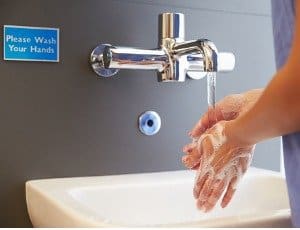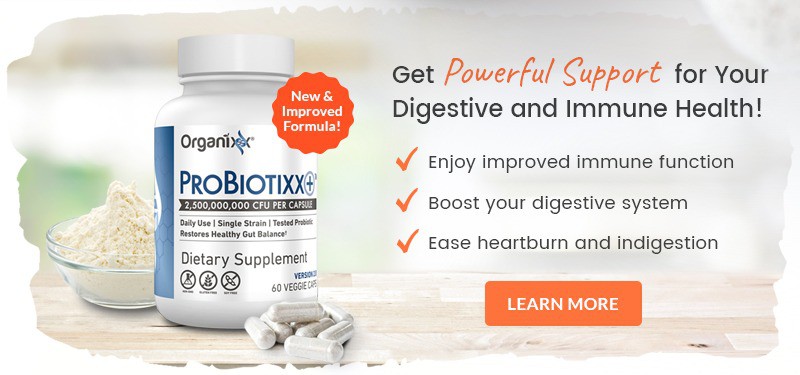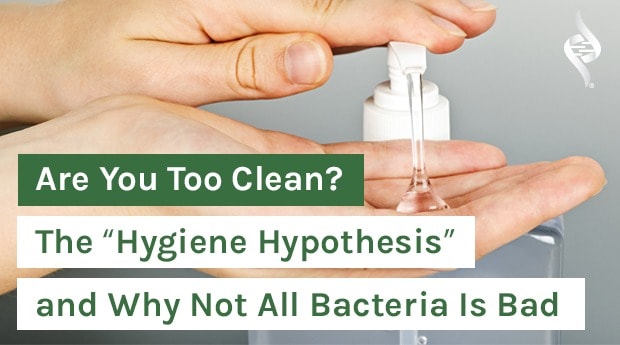Are You Too Clean? The “Hygiene Hypothesis” and Why Not All Bacteria Is Bad
In a hurry? Click here to read the Article Summary...
About 75% of American adult men and women say that they shower at least once a day [1]. While it’s definitely more pleasant being around people who clean themselves regularly, is slathering on hand sanitizer, bathing with anti-bacterial soap, and filling the air with germ-killing sprays a smart move?
Could being a “germaphobe” actually make you sicker instead of healthier in the long term? Read on for some surprising facts on how our modern obsession with “sanitizing” may be making our immune systems weaker.
The Importance of Beneficial Bacteria
To understand why constant washing and sanitizing may not be such a good thing after all, we have to first focus our attention on  the microscopic world of bacteria.
the microscopic world of bacteria.
Bacteria started to get a bad rap back in the late 19th century when Robert Koch [2], a noble-prize winning German doctor, linked certain bacterium to disease.
That sparked a sanitation revolution in Europe and worldwide that no doubt saved the lives and lengthened the lifespans of individuals worldwide in an era of plague and sanitation-based disease.
For decades, bacteria were seen as primarily pathogen – things to be irradiated, wiped clean, and gotten rid of completely. But now that climate of “bacterial doom and gloom” is changing.
Researchers, doctors, and the public at large are learning more about the benefits of bacteria. In fact, according to many studies, it turns out that we may need a diversity of both bad and good micro-organisms for our very survival.
What Is the “Hygiene Hypothesis”?
The tide of negativity against bacteria began to turn almost 30 years ago when David Strachan, a British epidemiologist, first hypothesized that exposure to mild childhood infections may provide a stronger defense against allergies than non-exposure. In a 1989 report [3], he called this his “Hygiene Hypothesis.”
 Other researchers have added to the theory over the years. Biologists at Russell Sage Collage in New York state that hay fever and allergy, which now affects over 20 million American children (6.1 million for hay fever and 15 million for other allergic reactions, including food allergies [4]), may be ultimately caused by immune systems that have forgotten how to use beneficial microbes.
Other researchers have added to the theory over the years. Biologists at Russell Sage Collage in New York state that hay fever and allergy, which now affects over 20 million American children (6.1 million for hay fever and 15 million for other allergic reactions, including food allergies [4]), may be ultimately caused by immune systems that have forgotten how to use beneficial microbes.
“It is essential to pass on the maternal microbiota – symbiotic harmless organisms in the gut, skin and elsewhere – and we need contact with the microbial biodiversity from the environment,” said one British scientist in a recent interview for the BBC [5].
Bacterial Exposure Begins at Birth
An increasing number of studies are connecting bacterial exposure early in life and a healthy immune system. The first bacterial exposure happens when a natural-birth baby comes out of the birth canal and is exposed to certain bacterial substances in the mother’s vagina. With a cesarean delivery (CD) the baby misses out on that crucial bacterial bath.
A 2012 study conducted by the University of Florida found that the rate of cesarean delivery had risen by 48% since 1996. They then make the correlation between higher rates of CD in industrialized countries and the “epidemic of both autoimmune diseases such as type 1 diabetes, Crohn’s disease, and multiple sclerosis and allergic diseases, such as asthma, allergic rhinitis, and atopic dermatitis [6].”
In addition, a French review of Hygiene Hypothesis research to date states interestingly that “(t)he presence of one or more older siblings protects against development of hay fever and asthma… as does attendance at day care during the first 6 months of life in the case of atopic dermatitis and asthma [7].” Other studies have found that exposure to animals such as dogs and livestock can prevent atopic diseases, especially if the mother is exposed during pregnancy [8].
Being Too Clean Can Harm Gut Microbiota
Another example of the importance of maintaining a biodiversity of bacteria is what we now know about the microbiome of the  digestive tract.
digestive tract.
There are literally trillions of microbes in our gut. Most of them exist in the large intestine, about 2-5 pounds of them if they were assembled all together. And here is a fact that may really bake your noodle: researchers have deduced that of all the cells in the human body, more than half are actually bacterial cells (40 trillion to 30 trillion human cells) [9].
Folks, this means that each one of us or more bacteria than human!
There are about 1,000 species of bacteria in the human gut. What’s more, each one has a specific role in your body. Yes, some are definitely pathogenic (i.e., disease-causing). Many more, however, help to break down food, especially fiber, and assist in the creation of vitamins and hormonal substances within the body. Most importantly, beneficial gut bacteria help to regulate the immune system since many of them are vital in communication between immune cells.
This makes sense since up to 80% of our immune system cells reside in the gut. Many researchers now hypothesize that beneficial bacteria not only support our immune system but are integral to the very development of immune defense mechanisms against infection on a cellular level [10].
Bacteria Can Even Help Your Brain
There is also increasing evidence that a healthy gut microbiome can help the brain and nervous system. Researchers at Texas Tech University, amongst others, have found that certain bacteria can help keep some types of anxiety and depression at bay (while others may promote these conditions) [11].
 Other investigations have found that putting your hands in the earth through gardening or otherwise “playing in the dirt” can help your gut and your mood no matter how old you are! Common garden soil contains the bacteria Mycobacterium. An award-winning 2016 study conducted at the University of Colorado, Boulder, found that Mycobacterium helps release serotonin in the brain as well as lower inflammation levels [12].
Other investigations have found that putting your hands in the earth through gardening or otherwise “playing in the dirt” can help your gut and your mood no matter how old you are! Common garden soil contains the bacteria Mycobacterium. An award-winning 2016 study conducted at the University of Colorado, Boulder, found that Mycobacterium helps release serotonin in the brain as well as lower inflammation levels [12].
Have we been duped into being too clean by 100 years of manufacturers promoting items like germ-killing mouthwash and aluminum-filled deodorant [13]? Perhaps.
The good news is that consumers like you are catching on that anything designed to “kill bacteria” isn’t making a distinction between beneficial and harmful types. Ditch “anti-bacterial” products for cleansers made with non-toxic ingredients.
And still use good old-fashioned common sense. Of course wash your hands after you go to the bathroom or sneeze. Cook that chicken all the way through. Be thankful for all the advances in sanitation systems that have saved entire populations from the epidemics of the past.
At the same time, you and your family probably don’t need to live in a bubble. A little exposure to microbes in the soil, from animals, and from other people just may do your body (and your beneficial bacteria) a world of good!
Organixx ProBiotixx+ formula contains a single, super-strain of Lactobacillus plantarum, designed to help alleviate constipation… eliminate gas and belly bloat… support your entire immune system… and give you total digestive protection.

 Sources:
Sources:
Article Summary
Our modern-day obsession with “sanitizing” our homes and bodies may actually be making our immune systems weaker.
For decades, bacteria were seen as primarily pathogen – things to be irradiated, wiped clean, and gotten rid of completely. But according to many studies, we need a diversity of both bad and good micro-organisms for our very survival.
Almost 30 years ago a British epidemiologist first hypothesized that exposure to mild childhood infections may provide a stronger defense against allergies than non-exposure. He called this his “Hygiene Hypothesis.”
Biologists at Russell Sage Collage in New York state that hay fever and allergy may be ultimately caused by immune systems that have forgotten how to use beneficial microbes.
The first bacterial exposure happens when a natural-birth baby comes out of the birth canal. With a cesarean delivery the baby misses out on that crucial bacterial bath.
There are about 1,000 species of bacteria in the human gut and each one has a specific role in your body. Beneficial gut bacteria help to regulate the immune system.
Still use common sense when it comes to cleanliness, but ditch “anti-bacterial” products for cleansers made with non-toxic ingredients.





You, my pal, ROCK! I found just the information I already searched everywhere and simply could not find it. What a great website.
I have always expected this I have had all the childhood illnesses and have not had a cold or flu for the past 22 years!!!!!!!
How interesting, Richard! We're glad to know that this article supports your childhood experience. Thank you for sharing your story with us!
It is amazing that our gut microbiome “talks” to our cells through cell signaling. That is why it’s so important to have a good base of our GI microbiome as it helps keep our somatic cells healthy. Dr. DT Crowe
Thank you for sharing your input on this matter, Dr. Dennis. We appreciate it!